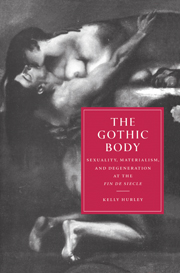Book contents
- Frontmatter
- Contents
- Acknowledgments
- INTRODUCTION
- PART I THE GOTHIC MATERIAL WORLD
- PART II GOTHIC BODIES
- 3 Evolutionism and the loss of human specificity
- 4 Entropic bodies
- 5 Chaotic bodies
- PART III GOTHIC SEXUALITIES
- AFTERWORD
- Notes
- Works cited
- Index
- CAMBRIDGE STUDIES IN NINETEENTH-CENTURY LITERATURE AND CULTURE
3 - Evolutionism and the loss of human specificity
Published online by Cambridge University Press: 26 August 2009
- Frontmatter
- Contents
- Acknowledgments
- INTRODUCTION
- PART I THE GOTHIC MATERIAL WORLD
- PART II GOTHIC BODIES
- 3 Evolutionism and the loss of human specificity
- 4 Entropic bodies
- 5 Chaotic bodies
- PART III GOTHIC SEXUALITIES
- AFTERWORD
- Notes
- Works cited
- Index
- CAMBRIDGE STUDIES IN NINETEENTH-CENTURY LITERATURE AND CULTURE
Summary
The philosophical ramifications of Darwin's theories are so immense that they strike at the most fundamental oppositions at the heart of Western culture: the difference between human and animal, male and female, Nature and culture. He reverses a system of signification at least as old as the Greek polis with whose emergence the images of hybrid and intermediary forms (centaurs, Amazons, Cyclops) were banished to the realms of monstrosity and otherness. With the disappearance of the Author from Darwin's universe, these oppositions, which had been elevated virtually to the status of logical categories or necessary ways of thinking about the world, collapsed into a kind of Derridean freeplay.
Margot Norris, Beasts of the Modern Imagination (p. 37)In 1884, H. G. Wells came to study at the Normal School of Science in South Kensington, established by T. H. Huxley for the training of science teachers who would staff the new public schools founded after the 1870 Education Act. Though his contact with Huxley was minimal – Wells attended Huxley's lectures for a course on advanced zoology January through June of 1885, and spoke to him only once, in greeting – Wells fell under Huxley's spell. “I believed then he was the greatest man I was ever likely to meet,” he wrote in 1901, “and I believe that all the more firmly today.” Wells admired Huxley's commitment to his life's project of explaining for the general public, in both his public lectures and his lucid, readable prose, the importance of a scientific education and the significance of new scientific ideas, most notably evolution theory.
- Type
- Chapter
- Information
- The Gothic BodySexuality, Materialism, and Degeneration at the Fin de Siècle, pp. 55 - 64Publisher: Cambridge University PressPrint publication year: 1996
- 2
- Cited by



